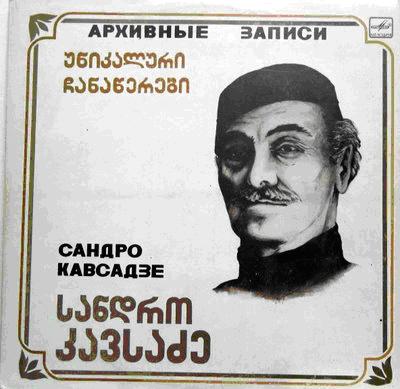Music
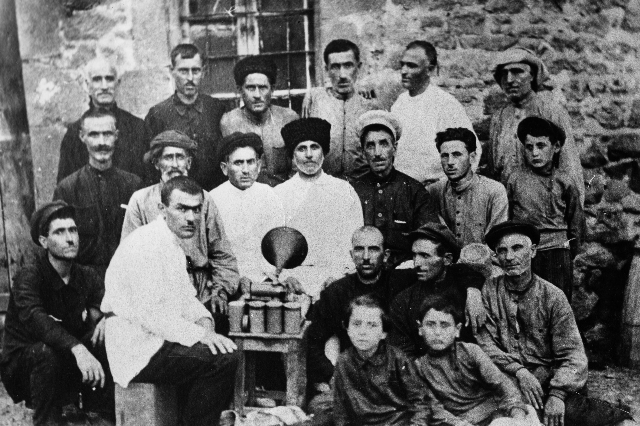
Some old recordings of Tush songs (whose interpreters are all — alas! — unknown to me), all downloaded from the excellent alazani.ge:
A lament for solo accordion
The famous "Daughter of Shatili"
(Georgian: შატილის ასულო)
A shepherd's song
Old recordings of songs from other regions (mostly from the same source i.e. alazani.ge):
An (incomplete) recording of a song for dancing (called სათამაშო,
"satamasho" i.e. "for playing, for fun, for dancing", in Georgian) from Tianeti, as well as
a dinner-table song (Georgian: სუფრული, "supruli") from the same region.
A recording of the Tush dalai — a lamentation for the soul of Zezva Gaprindauli, sung every year in the Batsbi's village of Zemo Alvani during zezvaoba (Georgian: ზეზვაობა; the yearly festival which commemorates his death). The song is in Georgian (perhaps even in the Tush dialect of Georgian?), but the song's title is clearly of Nakh origin, for the "dal" root means "God" in Nakh languages i.e. in Chechen, Ingush and Batsbur and the style of singing is unique in Georgia. I am not sure whether this dalai is particular to the memory of Zezva Gaprindauli, or whether instead dalai can be sung to the memory of any (male) deceased.
Two songs in Batsbur (also known as Tsova-Tush), recorded in the Bats village of Zemo Alvani in the eastern Georgian province of Kakheti. These are perhaps the only recordings of songs in Batsbur... (The first is sung by Patima (? Ushurauli), the second by the women of the 'Keselo' ensemble.)
Sandro Kavsadze ✝
1874-1939
Sandro Kavsadze was one of Georgia's greatest singers. Born in 1874 in the village of Khovle (in the Kaspi district of eastern Georgia), he was first taught to sing by his father, Grigoli Kavsadze, a priest. Later, Sandro continued to study singing at the seminary in the town of Gori. His teacher there, Simon Goglichidze, was a renowned singer himself, and within a few years Kavsadze had become a proficient singer and had been designated Goglichidze's deputy and substitute. (A certain Ioseb Jughashvili, later known as "Koba" and "Stalin", also studied in the seminary in Gori, where he was a contemporary of Sandro's.)
In 1893, after finishing his clerical studies, Kavsadze formed his own choir and performed concerts for charity; he also formed choirs in Tbilisi (in 1896) and Poti (in 1897). In 1911, Sandro left his group under the direction of his brother Mikheil, and moved to western Georgia. He formed several choirs there — in Satchkere, Tkibuli, Chiatura, Zestaponi and Kutaisi — and Kavsadze also taught Georgian folk music in schools and high-schools. In all, he spent twenty years in the region of Imereti, where he made an enormous contribution to the revival of traditional music and folklore.
Almost twenty years later, in 1930, Sandro was given the (rather Soviet) title of "Artistic Figure of Merit", and the thirtieth jubilee of his work was celebrated. In 1935 he was asked to move to Georgia's capital Tbilisi, where he was commissioned to set up and prepare an Eastern Georgian Folkloric Ensemble for the "Decade of Georgian Culture" — an art and folklore festival which was to be held in Moscow.
In 1937, Kavsadze and his ensemble travelled to Moscow, where they performed to great acclaim, winning an award. After the festival, a meeting was held in the Kremlin between the Politburo and all the festival's participants; this meeting gave rise to the following anecdote:
The story has it that the festival's participants — singers, dancers, artistic directors, &c. — were gathered in the Kremlin's Georgievsk Hall, where they were nervously awaiting Stalin's arrival. At last, the Man Himself entered the room — A "hurrah!" resounded, but Stalin lifted up his hand to bid those gathered be silent. He looked around the room at length, clearly searching for someone. Everyone became anxious: Whom was he looking for?? What should they do?! At last, Stalin asked in a low voice "if Sandro was there." Everyone breathed a sigh of relief, and the crowd parted to form a passage: at one end, Stalin; at the other, Sandro. It was of course protocol that the person meeting Stalin should walk up to him, but Sandro didn't move — a clear slight to the Great Man. They stared at each other for a few seconds, surrounded by the stunned crowd. Stalin then took the first step, followed by Sandro, and they met in the middle of the room, and embraced each other. "You have not changed," said Stalin, giving Sandro a pat on the back. Sandro remained silent, and patted Stalin on the back. "Indeed, you have not changed," repeated Stalin, patting Sandro on the back again. They conversed in low voices, Stalin asking Sandro if there was anything He could do for him? "Give me your pipe," said Sandro — The pipe has been a Kavsadze family heirloom ever since.
After Moscow, Sandro and his ensemble were bidden to travel onwards to Leningrad (formerly St. Petersburg, and now St. Petersburg again). However, shortly after the festival, Sandro (by then 63 years old) fell ill, and was hospitalized in the Kremlin. Lying in the hospital, Sandro received a letter. On the envelope was written "To Comrade Alexandre Kavsadze, from Stalin." The letter read: "Greetings to Sandro! ["sandros gaumardjos!" in Georgian] I happened to learn from Egnatashvili that you are in the Kremlin hospital. This is bad news, but the doctors tell me that you will get better soon. If you need anything, please let me know, for I am ready to help you in any manner. May you live for a thousand years! Your Soso, 1937."
Too ill to continue touring, Sandro remained in Moscow, and the Ensemble continued under the direction of his son, Davit Kavsadze (1907-1952). Having arrived in Leningrad, they repeated their success, and for his achievements Sandro was awarded an Order and was named "Honoured Artist of the Georgian [Soviet Socialist] Republic".
Sandro returned to Tbilisi shortly afterwards, where he died on 12 June 1939.
* * *
In 1986, the Russian "Melodiya" label re-issued 16 old recordings of Sandro Kavsadze and his Ensemble on an LP entitled Sandro Kavsadze — Georgian Songs from the Archive (Melodiya M30―46085―86; see image of cover above; I believe this record has itself been re-issued as a CD). The following four songs were recorded from the LP:
Urmuli (Georgian: ურმული)
A carter's song from eastern Georgia
(recorded 1909)
Mtao, gadmishvi (G.: მთაო, გადმიშვი)
"Let me pass, o mountain!"
(recorded 1909)
Gutnuri (G.: გუთნური)
A ploughman's song
(date of recording unknown)
Chona (G.: ჩონა)
A Christmas choral traditionally sung from door to door
(recorded between 1907 and 1909)
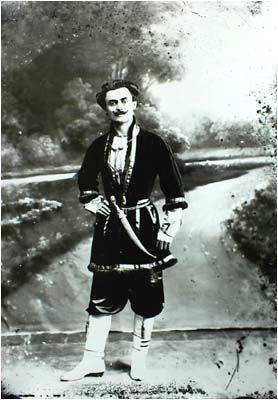
Sandro's younger brother Mikheil was also an extremely accomplished and successful singer (and clearly quite a snappy dresser!). Here are some recordings of Kavsadze Jr. and his ensemble of singers (all recorded in 1914):
Herio, bitchebo! (G.: ჰერიო, ბიჭებო!)
A work song sung during scything
Lalo, va, i aralo (G.: ლალო, ვა, ი არალო)
Shashvi, kakabi (G.: შაშვი, კაკაბი)
"Thrush, rock partridge"
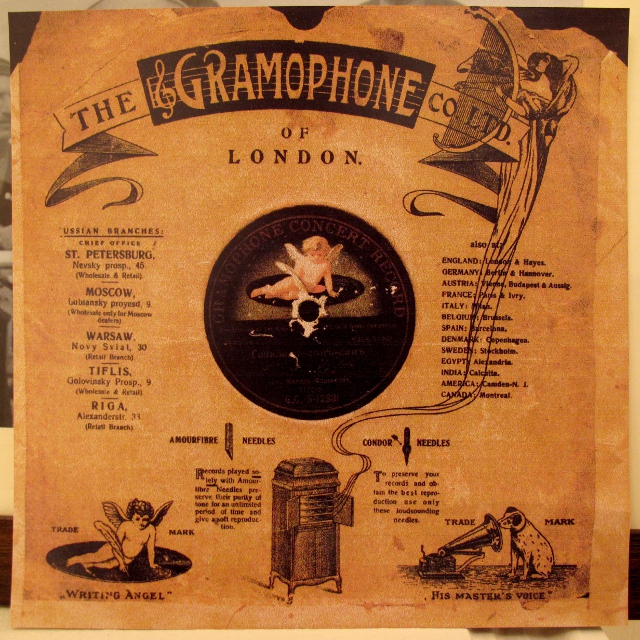
The London Gramophone Company (which would later become His Master's Voice) had an overseas office in Tbilisi from 1901 to 1918, and during this period the Company's sound engineers (notably the amazing Franz Hampe) succeeded in recording hundreds of songs in even the most remote regions of the Caucasus mountains (not to mention Central Asia). The commercial rationale for this was that by offering recordings of famous local artists and popular songs or instrumental pieces the LGC would encourage people to buy their gramophones.
A CD entitled Before the Revolution: A 1909 Recording Expedition in the Caucasus and Central Asia by the Gramophone Company and released on the "Topic" record label in 2002 was entirely compiled from material recorded by Franz Hampe and his colleagues at the London Gramophone Company. The Caucasian recordings which feature on this CD are in many different languages (Ossetian, Chechen, Ingush, Kabard, Kumyk, Armenian, Georgian and Azeri).
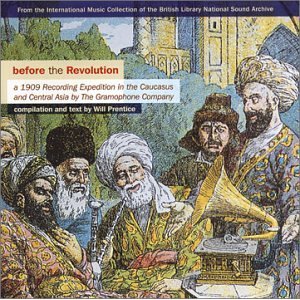
For more information on Mr Hampe and the exploits of the London Gramophone Company in the Caucasus and Central Asia, I suggest you read an excellent article on the LGC's activities and archives written by Mr. Will Prentice, which was published in the 23rd edition of Playback, the bulletin of the British Library's National Sound Archive. (Mr. Prentice was also instrumental in the compilation and release of the above-mentioned Before the Revolution... recordings.)
Another excellent compilation of old recordings of Georgian music is Drinking Horns and Gramophones 1902-1914: The First Recordings In The Georgian Republic, which was released on the "Traditional Crossroads" record label in 2001.
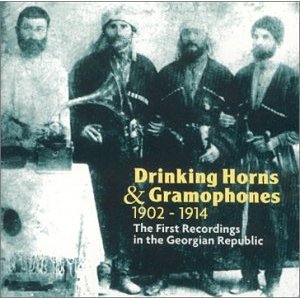
Two amazing songs recorded in Armenia in 1909 by those amazing people at the London Gramophone Company:
Alagyaz badzr sar-e
("Alagyaz is a mighty mountain")
En inch man era ak'ayakan
("What a kingly thing this is")
For more traditional music — not only from the Caucasus, but from all around the world e.g. Ethiopia, Bulgaria, Afghanistan (including Kafiristan/Nuristan, &) — go to traditionalsounds.blogspot.com.
Unless stated otherwise or obviously not the case, all the text and images on this website are © A.J.T. Bainbridge 2006-2011
Do get in touch! Gmail: alexjtb

